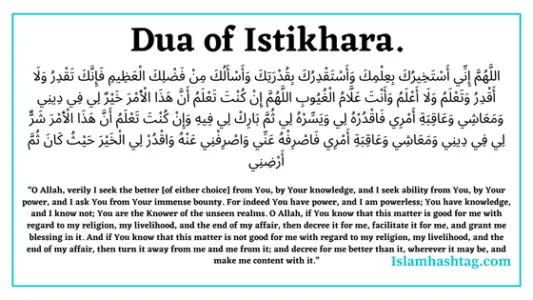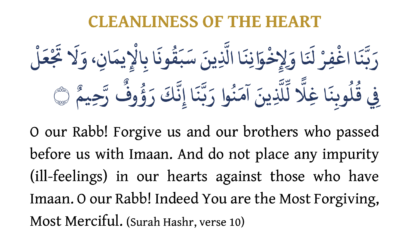Istikhara dua with english translation:
The Istikhara dua in Arabic
اللَّهُمَّ إِنِّي أَسْتَخِيرُكَ بِعِلْمِكَ وَأَسْتَقْدِرُكَ بِقُدْرَتِكَ وَأَسْأَلُكَ مِنْ فَضْلِكَ الْعَظِيمِ فَإِنَّكَ تَقْدِرُ وَلَا أَقْدِرُ وَتَعْلَمُ وَلَا أَعْلَمُ وَأَنْتَ عَلَّامُ الْغُيُوبِ اللَّهُمَّ إِنْ كُنْتَ تَعْلَمُ أَنَّ هَذَا الْأَمْرَ خَيْرٌ لِي فِي دِينِي وَمَعَاشِي وَعَاقِبَةِ أَمْرِي فَاقْدُرْهُ لِي وَيَسِّرْهُ لِي ثُمَّ بَارِكْ لِي فِيهِ وَإِنْ كُنْتَ تَعْلَمُ أَنَّ هَذَا الْأَمْرَ شَرٌّ لِي فِي دِينِي وَمَعَاشِي وَعَاقِبَةِ أَمْرِي فَاصْرِفْهُ عَنِّي وَاصْرِفْنِي عَنْهُ وَاقْدُرْ لِي الْخَيْرَ حَيْثُ كَانَ ثُمَّ أَرْضِنِي
Istikhara dua english Transliteration
Allâhumma inni astakhiruka bi ilmika wa astaqdiruka biqudratika wa as’aluka min fadlikal-azimi, fa innaka taqdiru walâ aqdiru wa ta’lamu walâ a’lamu wa anta allamul ghuyubi. Allâhumma in kunta ta’lamu anna hâdhal amra khayrun li fi dini wa ma-ashi wa aqibati amri faqdir-hu li wa yassir-hu li thumma barik li fihi wa in kunta ta’lamu anna hâdhal amra sharrun li fi dini wa maâshi wa aqibati amri fasrifhu anni wasrifni anhu waqdir liyal-khayra haythu kâna thumma ardini.
Istikhara dua Translation
“O Allah, verily I seek the better [of either choice] from You, by Your knowledge, and I seek ability from You, by Your power, and I ask You from Your immense bounty. For indeed You have power, and I am powerless; You have knowledge, and I know not; You are the Knower of the unseen realms.
O Allah, if You know that this matter is good for me with regard to my religion, my livelihood, and the end of my affair, then decree it for me, facilitate it for me, and grant me blessing in it. And if You know that this matter is not good for me with regard to my religion, my livelihood, and the end of my affair, then turn it away from me and me from it; and decree for me better than it, wherever it may be, and make me content with it.”
Importance of Istikhara
Istikhara dua is used for seeking guidance from Allah before making important decisions.
In this article we will read what is the Istikhara dua ? What is the significance of Istikhara الاستخارة in Islam? How to properly perform the Istikhara prayer?
Istikhara Dua is a powerful prayer that is performed to seek guidance and clarity from Allah (SWT) when making important decisions. The word Istikhara means “to seek goodness” or “to seek guidance”, and the purpose of this dua is to ask Allah (SWT) for His divine guidance and help in making the right decision.
The importance of this dua lies in its ability to connect us with Allah (SWT) and seek His guidance in all aspects of our lives. It helps us to make informed decisions that are aligned with the will of Allah (SWT) and avoid any potential harm or negative consequences.
Moreover it is not just limited to major life decisions but can be performed for any matter, big or small. It is a way to seek Allah’s guidance in all aspects of our lives, including our personal relationships, career choices, and even daily routines.
Among the many difficulties that man undergoes is ‘confusion’ and ‘perplexity’. Almost everyday in his life, man is faced with the task of making a decision between two or more choices. Generally the decisions are not major but occasionally they do become quite serious. Even in these circumstances, our beloved mentor, Rasûlullâh Sallalahu alaihe wa sallam taught us what to do, and clearly outlined the solution. This solution is called ‘Istikhara’.
Also read : Ayatul kursi and inna lillahi wa inna ilaehe rajiun
We learn from this âyah that man has limited knowledge and deficient intellect. At times he may desire something, which may prove harmful to him, and on the other hand, he may dislike something, while it is good for him. The sole possessor of perfect knowledge, and the only knower of the unseen is Allâh , the Creator of man and the Controller of the system of the universe. Thus, whenever a person desires any good, he may only obtain it from Allâh . A Hadîth states:
“مِنْ سَعَادَةِ ابْنِ آدَمَ اسْتِخَارَتُهُ اللهَ وَمِنْ شِقْوَتِهِ تَرْكُهُ اسْتِخَارَةَ اللهِ “
“It is from the good fortune of man that he makes Istikhârah (seeks good) from Allâh, and it is from his misfortune that he discards Istikhârah (seeking good) from Allâh.”
How to perform Istikhara prayer? The Method of Istikhara
Hadrat Jâbir ra reports: Rasûlullâh taught us to make Istikharah concerning all matters in the same way as he would teach us a sûrah of the Qur’ân. He would say: “When any of you wishes to take up any task, he should perform two rakaât of Salâh other than that of fard (meaning two rakaât of nafl with the intention of Istikhâra). He should then say (in supplication):
اللَّهُمَّ إِنِّي أَسْتَخِيرُكَ بِعِلْمِكَ وَأَسْتَقْدِرُكَ بِقُدْرَتِكَ وَأَسْأَلُكَ مِنْ فَضْلِكَ الْعَظِيمِ فَإِنَّكَ تَقْدِرُ وَلَا أَقْدِرُ وَتَعْلَمُ وَلَا أَعْلَمُ وَأَنْتَ عَلَّامُ الْغُيُوبِ اللَّهُمَّ إِنْ كُنْتَ تَعْلَمُ أَنَّ هَذَا الْأَمْرَ خَيْرٌ لِي فِي دِينِي وَمَعَاشِي وَعَاقِبَةِ أَمْرِي فَاقْدُرْهُ لِي وَيَسِّرْهُ لِي ثُمَّ بَارِكْ لِي فِيهِ وَإِنْ كُنْتَ تَعْلَمُ أَنَّ هَذَا الْأَمْرَ شَرٌّ لِي فِي دِينِي وَمَعَاشِي وَعَاقِبَةِ أَمْرِي فَاصْرِفْهُ عَنِّي وَاصْرِفْنِي عَنْهُ وَاقْدُرْ لِي الْخَيْرَ حَيْثُ كَانَ ثُمَّ أَرْضِنِي
Istikharah for Marriage
Abû Ayyûb Ansârî $ reported that Rasûlullâh SAW said :Conceal the proposal, then perform wudûproperly, thereafter perform as many rakaât as Allâh destined for you. After having performed Salâh, praise and extol your Sustainer, then say:
“O Allâh, You have power and I have none, and You know and I do not know, and You are the Knower of the unseen. If in Your knowledge (so and so name ) be good for me with regards to my Dîn(religion), my worldly affairs as well as those that relate to my hereafter, then destine her for me; and if someone else be better for me than her with regards to my Dîn (religion), my worldly affairs as well as those that relate to my hereafter, then destine her for me.”.
Looking for Signs in Istikhara
One should suspend one’s own judgment or inclination about a particular matter and wait for Allah to show one a sign or to make things happen in a way that indicates what to do. When one is unclear about the result of the istikhara, the fuqaha mention that it is recommended to repeat it up to 7 times if necessary (usually done on separate occasions). [cf: Ibn ‘Abidin, Radd al-Muhtar]
When Unable to Offer Salah
In general, when it is not possible to perform the istikhara prayer itself (such as when one is out on the road or in one’s menstrual period), it is recommended to simply read the dua itself. [Radd al-Muhtar]
Benefits of istikhara
Hadrat Shâh Waliyyullâh االله رحمــه writes: “From among the greatest benefits of Istikhârah is that man becomes detached from his carnal desires, his animalistic characteristics become subject to his angelic nature, and he hands himself over to Allah.
When he does this, he reaches the stages of the angels whose quality is that they await the command of Allâh When Allah’s command is received, they exert themselves through divine inspiration and not carnal motivation. I believe that frequent Istikharah is a proven tonic for the inculcation of angelic qualities.”
- Istikhara in one of the great sunan of our Beloved Prophet sallallaahu’alaihi wasallam. He taught it to his companions in the same way that he taught them a surah of the Qur’an.
- It is not necessary to perform Istikhara before sleeping, although it was the preference of some saints.
- It is not necessary to see a dream in Istikhara. If someone is used to seeing true dreams, then it is likely that his dream be true. As for others, the dream seen after performing. Istikhara falls into the same three categories as other dreams.
How Many Times should istikhara be done ?
As far as the performance of ‘Istikhârah’ more than once is concerned, ulema deem it mustahabb to perform it 3 times. There is however no problem in performing Istikhârah asmany times as one wishes to, just as there is no problem in making the same du’â many times
The Short dua of Istikhârah
In a ‘weak’ narration Hadrat Abû Bakr radi allahu anhu is reported to have stated that whenever Rasûlullâh SAW intended to do anything, he used to say:
“O Allâh, destine good for me, and choose for me.”
Method of Istikhara in Hadeeth
One should resort to the methods mentioned in the following narrations:
عَنْ جَابِرِ بْنِ عَبْدِ اللَّهِ ـ رضى الله عنهما ـ قَالَ كَانَ رَسُولُ اللَّهِ صلى الله عليه وسلم يُعَلِّمُنَا الاِسْتِخَارَةَ فِي الأُمُورِ كَمَا يُعَلِّمُنَا السُّورَةَ مِنَ الْقُرْآنِ يَقُولُ “ إِذَا هَمَّ أَحَدُكُمْ بِالأَمْرِ فَلْيَرْكَعْ رَكْعَتَيْنِ مِنْ غَيْرِ الْفَرِيضَةِ ثُمَّ لِيَقُلِ اللَّهُمَّ إِنِّي أَسْتَخِيرُكَ بِعِلْمِكَ وَأَسْتَقْدِرُكَ بِقُدْرَتِكَ، وَأَسْأَلُكَ مِنْ فَضْلِكَ الْعَظِيمِ، فَإِنَّكَ تَقْدِرُ وَلاَ أَقْدِرُ وَتَعْلَمُ وَلاَ أَعْلَمُ وَأَنْتَ عَلاَّمُ الْغُيُوبِ، اللَّهُمَّ إِنْ كُنْتَ تَعْلَمُ أَنَّ هَذَا الأَمْرَ خَيْرٌ لِي فِي دِينِي وَمَعَاشِي وَعَاقِبَةِ أَمْرِي ـ
أَوْ قَالَ عَاجِلِ أَمْرِي وَآجِلِهِ ـ فَاقْدُرْهُ لِي وَيَسِّرْهُ لِي ثُمَّ بَارِكْ لِي فِيهِ، وَإِنْ كُنْتَ تَعْلَمُ أَنَّ هَذَا الأَمْرَ شَرٌّ لِي فِي دِينِي وَمَعَاشِي وَعَاقِبَةِ أَمْرِي ـ أَوْ قَالَ فِي عَاجِلِ أَمْرِي وَآجِلِهِ ـ فَاصْرِفْهُ عَنِّي وَاصْرِفْنِي عَنْهُ، وَاقْدُرْ لِي الْخَيْرَ حَيْثُ كَانَ ثُمَّ أَرْضِنِي بِهِ ـ قَالَ ـ وَيُسَمِّي حَاجَتَهُ ”.
Narrated Jabir bin `Abdullah: The Prophet (Sallallahu Alayhi Wasallam) used to teach us the way of doing Istikhara (Istikhara means to ask Allah to guide one to the right sort of action concerning any job or a deed), in all matters as he taught us the Suras of the Qur’an.
He said, “If anyone of you thinks of doing any job he should offer a two rak’at prayer other than the compulsory ones and say (after the prayer): (O Allah! I ask guidance from Your knowledge, And Power from Your Might and I ask for Your great blessings. You are capable and I am not. You know and I do not and You know the unseen.
O Allah! If You know that this job is good for my religion and my subsistence and in my Hereafter–(or said: If it is better for my present and later needs) –Then You ordain it for me and make it easy for me to get, And then bless me in it, and if You know that this job is harmful to me In my religion and subsistence and in the Hereafter-
-(or said: If it is worse for my present and later needs)-Then keep it away from me and let me be away from it. And ordain for me whatever is good for me, And make me satisfied with it). The Prophet (Sallallahu Alayhi Wasallam) added that then the person should name (mention) his need. (Bukhari– 1166)
عَنْ عَائِشَةَ، عَنْ أَبِي بَكْرٍ الصِّدِّيقِ، أَنَّ النَّبِيَّ صلى الله عليه وسلم كَانَ إِذَا أَرَادَ أَمْرًا قَالَ “ اللَّهُمَّ خِرْ لِي وَاخْتَرْ لِي ” .
Aishah (Radhiyallahu Anha) narrated from Abu Bakr As-Siddiq (Radhiyallahu Anhu): that whenever the Prophet (Sallallahu Alayhi Wasallam) wanted to do a matter, he would say: “O Allah, make it good for me and choose for me. (Tirmidhi- 3516)
Istikharah point to remember
- The inclination or feeling that one finds after Istikhârah is not necessarily part of the Istikhârah. Persons who are used to receiving divine inspirations (ilham) may regard their inclination to be such. Others should not pay attention to such feelings.
- It is best to perform as many raka’at as possible before reciting the dua. The performance of at least two raka’at is a sunnah of Istikharah.
- Istikhara can be performed by merely reciting the dua, without performing any salah. It may also be recited after any fard salah.
- Istikhara is a form of dua. It may thus be performed until the task is accomplished. To perform it at least three times is the best. Once may also suffice.
- Istikhara may even be performed by someone who has an overwhelming desire towards one of the two options. If his desire is not in conformance to what is best for him, by virtue of his Istikharah, he will saved from it, and will be directed towards that which is best for him.
- The essence of Istikharah is that one is thereby handing his matter over to Allah, and placing all trust in him.
- Istikhara is a great means of inculcating the attribute of tawakkul.
- When one makes Istikharah, he becomes satisfied with Allah’s decision for him. This imbibes into him the attribute of always being pleased with Allah’s will.
- During the cause of, or after having performed Istikharah, there is no problem in consulting with anyone about the issue under concern. Such consultation is called mashurah, which in itself is a sunnah.
Ref Fatwa and notes made from Istikhara in the light of sunnah
Discover more from Islam Hashtag
Subscribe to get the latest posts sent to your email.








